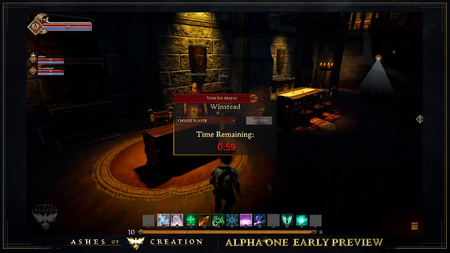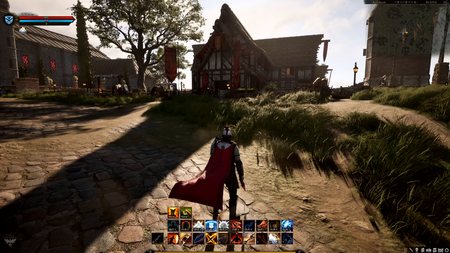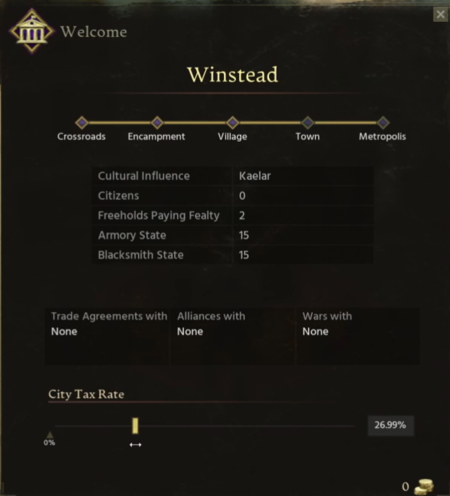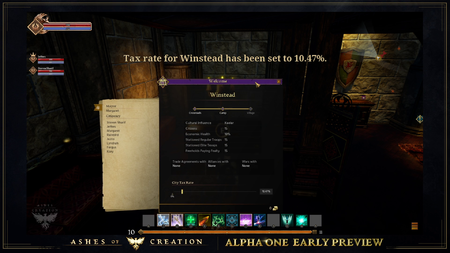Gobierno en los nodos
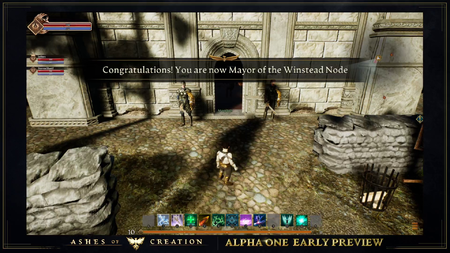
There are a number of different seats that can exist within a node, and carry different responsibilities.[2] – Steven Sharif
Positions within a node's government are attained through seasonal titles that grant special powers and benefits within the node.[3][2][4][5]
There are other node-based positions. Most of them relate to social organizational structures like the temple and the social organization building that the node might construct. Those are ladder systems of achievement that players can work through on a seasonal basis to achieve the highest level of that for the particular node; and by doing so they will then have titles bestowed upon them, which grants certain types of powers and benefits.[3] – Steven Sharif
- Alcaldes.[6]
- Priests, bishops, or acolytes of temples.[3][7][4]
- Social organization positions.[3]
- Patron guild leaders.[4]
- Chief bounty hunter.[4]
Elecciones en los nodos
Una vez que un nodo ha alcanzado la fase de aldea habrá un período de "cooldown" de una semana antes de que comiencen las elecciones del nodo.[9]
- Este período de "cooldown" permitirá a los jugadores establecerse como ciudadanos en la aldea; lo que quizá implique renunciar a la ciudadanía que tuviera en otro nodo .[9]
- Después del "cooldown" inicial, habrá una semana de proceso electoral; a partir de ese momento y en adelante, las elecciones tendrán una preiodicidad mensual.[9]
- Los asedios del nodo no podrán ser declarados en los siguiente 21 días del avance del nodo a cualquier fase.[10]
The village stage is a unique stage because that's when the government system comes online and all other stages past village there will have already been a cadence for the election system and it will follow that cadence, but after the initial village stage is completed there will be a one week period where players have an opportunity to establish citizenship at the village that also provides for the cooldown time that is- that would be present on players leaving another node to participate in in this particular node leveling up. But that after that one week period then there will be a one-week election process and then from that point moving forward will be the one month cadence that the node experiences elections on.[9] – Steven Sharif
Las elecciones en los nodos tienen una periodicidad mensual.[9][12]
- Las noticias relacionadas con las elecciones serán enviadas al email de los ciudadanos.[13]
- Solo los ciudadanos de un nodo podrán participar en sus elecciones.[5]
- Solo los ciudadanos del nodo podrán ser elegidos como alcaldes.[14]
- Un rey o reina también puede ser declarado alcalde.[14]
El gobierno en los nodos y los alcaldes se eligen de formas diferentes en función del tipo de nodo.[16][17]
El gobierno en los nodos divinos es elegido por los ciudadanos mediante la realización de misiones que prueben la devoción y dedicación con el nodo.[18][16]
- La mayoría de estas tareas van a ser individuales y no emplearán ayuda externa.[19]
El gobierno de los nodos económicos podrá ser comprado y vendido por los ciudadanos con más dinero.[18][16]
- Los desarrolladores están a favor de que haya una campaña de financiación pública para los fondos de la campaña y de las contribuciones para los candidatos a la alcaldía.[20]
- Los alcaldes de los nodos militares son elegidos entre los ciudadanos a través de una arena de combate del último hombre en pie (estilo arena de gladiadores).[18][21][22]
- Una idea que está ahora mismo bajo consideración es que los jugadores preparen un campeón con el que luego puedan luchar en la arena, en lugar de usar sus personajes habituales. Este campeón podría ser preparado con equipo y habilidades a través de misiones, además de con materiales y oro con el objetivo de hacer el campeón más poderoso.[23]
- El motivo de esta idea del campeón es que el juego no está equilibrado para el Pvp 1vs1. Emplear estos campeones hará que la arena esté más equilibrada.[23]
- El estilo de combate de la arena será instanciado pero se permitirán espectadores a través de una interfaz.[24]
- El ganador del combate no podrá transferir la alcaldía a otro jugador.[25]
La elección del gobierno de los nodos científicos se realiza mediante un proceso democrático.[18][16] Los registros de a quien voto cada ciudadanos no son públicos.[13]
Ayuntamiento
Town hall (also called City hall) is a default service building that comes pre-built with nodes.[28][29][30][27]
- Players can interact with the node board to get a list of its citizens.[13] Clicking on a citizen will reveal information about their guild, society, religion, and property ownership.[13]
- Alcaldes and node governments use city hall to visualize and control activities within their node. These capabilities will also be available via mobile/web interface.[6]
- Status of the node's economy.[6]
- Status of upcoming elections.[6]
- Status of trade agreements.[6]
- Status of caravans.[6]
Alcaldes
Los alcaldes son los gobernantes del nodo y los que controlan el desarrollo de ese nodo.[6]
- Coordinar el tráfico de los recursos que los ciudadanos necesitan mediante el uso de las caravanas.[33]
- Otras tareas del gobernante.[6]
Solo los ciudadanos de los nodos pueden ser elegidos como alcaldes.[14]
- Solo un ciudadanos puede ser elegido por cuenta y por servidor.[14][15]
- Esto podría cambiar a un ciudadano por cuenta.[34]
- Un rey o una reina también puede convertirse en alcalde.[14]
- You may only ever be a citizen of a single node at a time.[14] – Steven Sharif
Los alcaldes obtienen nuevos poderes y responsabilidades conforme el nodo avanza.[17]
- Los nodos tienen una serie de políticas de nodo que son propuestas por el alcalde y votadas por los ciudadanos.[35][36]
- El título de alcalda desbloquea habilidades especiales, así como stats durante los asedios o eventos.[7]
- Los alcaldes son avisados cuando su nodo es citado en un pergamino de declaración de asedio.[37]
- The mayor is made aware of what scroll has been generated if their node is the one that's named on the scroll.[37] – Steven Sharif
Poderes de los líderes
Poderes de los líderes may refer to.
Node development
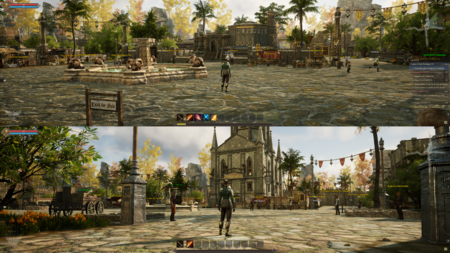
The layout and architecture within a Node’s development area are determined by influential race. For example, a stage 3 Node with the majority of player contribution being Py'rai would have a Py'rai village with Py'rai architecture. Most NPCs would be Py'rai elves, and offer questlines within the Py'rai narrative.[17] – Margaret Krohn
Each player’s contributed experience is flagged with their character race and other identifiers. When a Node advances, the race with the highest experience contribution determines the Node’s style and culture. This style and culture change can happen at every Node Stage. For example, if a Node advances to Level 2 - Encampment Stage and 51% of all experience was earned by Ren’Kai players, the Node will be a Level 2 Ren’Kai Node. If that same Node advances to a Level 3 - Village Stage Node, but the Py'Rai contributed 62% of all the experience earned, then the Node will be a Level 3 Py'Rai Node.[38] – Margaret Krohn
El diseño de un nodo y su estilo es determinado por varios factores:[39]
- La localización y el entorno (bioma) del nodo.[40][41][39]
- Nodes will adjust the local topography to fit the aesthetic and mechanical requirements of the node.[40] – Steven Sharif
- Los nodos ajustarán la topografía local para adaptarse a los requisitos estéticos y mecánicos del nodo.[42]
Currently the way that the platform system is set up, is it's capable of adjusting the topography of the node's footprint, regardless of the surrounding terrain. So the reason for that is we want to have flexibility in the presentation of the node's layout and how it is essentially both from an aesthetic standpoint as well as a mechanical standpoint with node sieges- how it's constructed and that construction should have the ability to take on a variance of different types of topography. So it shouldn't be dependent on the surrounding area. Now that's not to say that the surrounding area isn't going to have some influence over. So for example... we're experimenting a little bit with the platform tech and putting up a node up against the side of a mountain or on the edge of a cliff or something that has a beautiful vista. Those are things that we're going to test out obviously as we continue to work on the node tool and how that platform system works, but the idea is to have the node independent of the surrounding terrain.[42] – Steven Sharif
- El tipo de nodo.[39]
Some parts are determined by the area it's in. Some parts are determined by the type it is. Some parts are determined by the race it is; and then the rest of it is determined by the mayor.[39] – Jeffrey Bard
- La raza que contribuya con el porcentaje más alto al avance del nodo modificará la apariencia racial de sus edificios, NPCs y objetos.[43][41][38][39][44][45]
- Las razas relacionadas entre ellas no combinan sus influencias culturales. Por ejemplo, los Py'Rai y los Empyrean cuentan como culturas diferentes. Su raza madre, los Pyrian, ya no existen.[46]
- Este cambio de estilo y cultura ocurre en cada etapa del nodo.[38]
- Esto aplica para todos los nodos, incluso los nodos de castillo.[47]
All nodes whether they're associated with a castle or associated with normal node structure has cultural influences that replicate over to the buildings that are produced and the NPCs that are present.[47] – Steven Sharif
- El resto es determinado por el alcalde del nodo.[39]
- Debería ser posible completar varios proyectos de construcción en un nodo durante el mes en el que el alcalde ostenta su cargo.[48]
- Q: How long would you say it will take players on average to fill slash build up a node completely from wilderness to metropolis?
- A: It's one thing to get a node to a certain level: it's another thing to develop the node; and I can't really give you an on-average expectation, because there's a lot of variables at play. There's how many citizens does the node have attracted to it; what's the type of traffic that the node is attracting to it based on things like its tax rates, or the specialization that it chose to spec into, based on the building types it's chosen to build. All of those things are variables that can affect the quote-unquote "average build-out time" of a particular node. So it's difficult to give you an average when there's so many variables along those lines. But the idea is that if there is a particular project that players are interested in in developing based on the node stage, that they would have the ability to complete several of those projects as within a single term of a mayor; and a term of a mayor is one month.[48] – Steven Sharif
Edificios de nodo
Asedios de nodos
As some areas in the world grow, others will fall. This is the foundation of the living, breathing world that is Ashes of Creation, where players will have the ability to make important decisions that matter in the longevity of an area becoming a city, or whether to siege a rival town. Rise above the ashes, create the world around you, and be a part of the story that unfolds because of your actions and decisions.[38] – Margaret Krohn
Los asedios a los nodos permiten a los jugadores destruir nodos.[38] Esto facilita el camino para el avance y acceso al contenido bloqueado de los nodos circundantes. Debido a esta dinámica, los conflictos e intrigas políticas juegan un papel muy importante en la estructura del mundo.[50]
- Asediar un nodo no será una tarea sencilla para los atacantes. Las ciudades y las metrópolis dispondrán de una ventaja defensiva considerable.[50]
- No habrá asedios de prueba, o prácticas de asiedio, aunque si que habrá sistema que simularán algunas de sus mecánicas.[51]
- Las penalización por muerte no aplicarán en los eventos basados en objetivos como son los asedios a los nodos.[52]
- If you own a home in a node and you don't want to see that home destroyed, you need to defend that city![53] – Steven Sharif
- La mayor parte del contenido (~80%) en Ashes of Creation es de mundo abierto pero puede haber combates instanciados dentro de los asedios a castillos y nodos donde grupos específicos pueden participar en combates pequeños y de corta duración basados en objetivos para conseguir puntos de ruta.[54]
Node politics
No habrá mecánicas relacionadas con guerras civiles en los nodos, pero si que habrá margen para conflictos internos; como puedan ser socavar el liderazgo del actual gobierno o interrumpir las rutas comerciales.[55]
- La única forma de expulsar a un alcalde antes de que termine su mandato es destruyendo el nodo.[56]
We want consequences to matter and if that person got elected then you need to work within the means of the mechanics to get them unelected.[56] – Steven Sharif
Trade agreements
Alcaldes can enter into trade agreements with other nodes to facilitate trade between the nodes.[57][58][27]
- There are a limited number of trade agreements that a node can have.[57]
- Caravanas consistoriales may only be initiated between nodes with trade agreements or alliances.[57][58]
- Trade agreements affect reputation between the nodes.[29][59]
- Mercenary guilds will be a viable way forward for different organizations. I think there will be a lot of business to be had with that; and one of the systems in our trade agreements is creating an escrow for those particular type of arrangements that we're looking into.[60] – Steven Sharif
Taxation
Los alcaldes pueden establecer los impuestos en sus nodos.[61]
- Esto incluye los impuestos para los juegos de taberna.[62][63]
Los alcaldes/gobernantes de los nodos asignan recursos, impuestos, and misiones para ayudar a desarrollar las defensas de los nodos.[32]
- El dinero de los impuestos solo se puede destinar al desarrollo de los nodos. Este oro no puede ser retirado por el alcalde ni por ningún otro jugador.[64][65]
- Las tasas de los impuestos varían según el momento en el que el jugador se unió al nodo como ciudadano. el objetivo de esto, es aplicar cierta presión financiera sobre las poblaciones de los nodos, haciendo que los impuestos sean cada vez más altos conforme el nodo avanza en lugar de establecer límites de población.[66]
Los nodos madre (soberanos) se llevan una parte de los impuestos de la vivienda así como de los servicios que se den en cualquier de sus nodos vasallos.[64][67]
- Estos impuestos no tienen porqué afectar a los ciudadanos, ya que los niveles de impuestos de los ciudadanos vienen impuestos directamente por su nodo,pero las finanzas del nodo si que se ven afectadas por los impuestos recaudados por los nodos madre (soberanos).[67]
When a node reaches stage 3 (Aldea) and a player run government has formed, all player housing will pay taxes.[68]
- A player's tax charge will be determined by the number of structures built on their plot.[69][65]
- Freehold taxes are calculated based on the number of permits issued for buildings on a freehold.[70][71][72][69][65]
- Buildings that require permits will have additional upkeep costs.[70]
- Maintaining businesses requires licensing and payments to the node your Freehold is associated with. This permitting system allows for a certain number of buildings to be constructed on a Freehold. Permits can be obtained from the same node the Freehold was certified from, and buildings that require permits will have an additional upkeep cost.[70]
- Housing foreclosures result from failing to pay property taxes or other fees.[70]
Ver además
Referencias
- ↑ Transmisión en vivo, 2020-03-28 (1:02:46).
- ↑ 2.0 2.1

- ↑ 3.0 3.1 3.2 3.3 Transmisión en vivo, 2023-09-29 (1:07:01).
- ↑ 4.0 4.1 4.2 4.3 Transmisión en vivo, 2019-07-26 (1:20:48).
- ↑ 5.0 5.1 MMOGames interview, January 2017
- ↑ 6.0 6.1 6.2 6.3 6.4 6.5 6.6 6.7 Transmisión en vivo, 2017-11-17 (9:49).
- ↑ 7.0 7.1 Transmisión en vivo, 2020-07-25 (1:52:45).
- ↑ Transmisión en vivo, 2020-03-28 (1:01:34).
- ↑ 9.0 9.1 9.2 9.3 9.4 Entrevista, 2020-03-27 (6:03).
- ↑
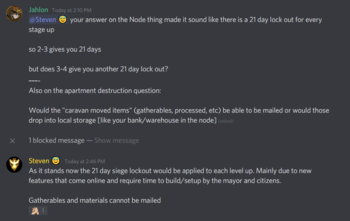
- ↑

- ↑

- ↑ 13.0 13.1 13.2 13.3 Transmisión en vivo, 2020-10-30 (1:01:00).
- ↑ 14.0 14.1 14.2 14.3 14.4 14.5 14.6

- ↑ 15.0 15.1 Entrevista, 2018-05-11 (50:05).
- ↑ 16.0 16.1 16.2 16.3 Node series part II – the Metropolis.
- ↑ 17.0 17.1 17.2 Blog - Know Your Nodes - The Basics.
- ↑ 18.0 18.1 18.2 18.3 Entrevista, 2020-07-19 (26:54).
- ↑ Transmisión en vivo, 2021-03-26 (1:18:26).
- ↑ Transmisión en vivo, 2021-11-19 (51:56).
- ↑

- ↑ Pódcast, 2018-05-11 (52:20).
- ↑ 23.0 23.1 Entrevista, 2020-03-27 (09:05).
- ↑ Entrevista, 2020-03-27 (11:04).
- ↑ Transmisión en vivo, 2021-03-26 (1:17:20).
- ↑ Vídeo, 2023-08-31 (49:05).
- ↑ 27.0 27.1 27.2 City hall.
- ↑ Vídeo, 2023-08-31 (33:07).
- ↑ 29.0 29.1 Blog: Development Update with Village Node.
- ↑ Transmisión en vivo, 2023-08-31 (50:25).
- ↑ Transmisión en vivo, 2018-12-12 (14:48).
- ↑ 32.0 32.1
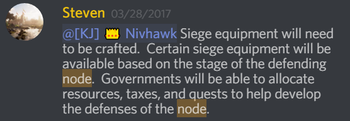
- ↑ 33.0 33.1 Transmisión en vivo, 2017-06-30 (53:57).
- ↑ Entrevista, 2018-10-20 (2:36).
- ↑ Transmisión en vivo, 2022-08-26 (1:12:40).
- ↑ Transmisión en vivo, 2022-04-29 (27:42).
- ↑ 37.0 37.1 Transmisión en vivo, 2021-12-23 (1:30:34).
- ↑ 38.0 38.1 38.2 38.3 38.4 Blog - Know Your Nodes - Advance and Destroy.
- ↑ 39.0 39.1 39.2 39.3 39.4 39.5 Transmisión en vivo, 2018-09-27 (53:06).
- ↑ 40.0 40.1 Transmisión en vivo, 2022-02-25 (41:00).
- ↑ 41.0 41.1 Transmisión en vivo, 2020-10-30 (39:17).
- ↑ 42.0 42.1 Transmisión en vivo, 2021-02-26 (1:12:18).
- ↑ Pódcast, 2021-04-11 (29:47).
- ↑ Entrevista, 2018-05-11 (54:34).
- ↑ Transmisión en vivo, 2017-05-26 (21:23).
- ↑ Pódcast, 2021-04-11 (23:36).
- ↑ 47.0 47.1 Entrevista, 2018-05-11 (47:27).
- ↑ 48.0 48.1 Transmisión en vivo, 2022-07-29 (1:13:09).
- ↑ Vídeo, 2016-12-04 (0:02).
- ↑ 50.0 50.1 A reactive world - Nodes.
- ↑ Twitch Bustin - Practice Sieges?
- ↑ Transmisión en vivo, 2020-12-22 (1:13:51).
- ↑ Vídeo, 2017-04-30 (5:31).
- ↑ Transmisión en vivo, 2022-01-28 (17:50).
- ↑ Transmisión en vivo, 2017-05-24 (40:50).
- ↑ 56.0 56.1 Transmisión en vivo, 2019-06-28 (1:26:14).
- ↑ 57.0 57.1 57.2 Transmisión en vivo, 2023-08-31 (2:10:23).
- ↑ 58.0 58.1 Vídeo, 2019-07-15 (2:12).
- ↑ Transmisión en vivo, 2023-08-31 (44:21).
- ↑ Transmisión en vivo, 2018-04-8 (AM) (18:59).
- ↑ 61.0 61.1 Transmisión en vivo, 2020-03-28 (1:03:38).
- ↑

- ↑

- ↑ 64.0 64.1 Transmisión en vivo, 2022-08-26 (1:10:16).
- ↑ 65.0 65.1 65.2

- ↑ Entrevista, 2020-03-27 (0:30).
- ↑ 67.0 67.1 Entrevista, 2018-05-11 (57:02).
- ↑

- ↑ 69.0 69.1 Transmisión en vivo, 2023-06-30 (1:45:22).
- ↑ 70.0 70.1 70.2 70.3 Blog: Exploring the Boundless Opportunities of Freeholds.
- ↑

- ↑ Entrevista, 2023-07-09 (54:46).
